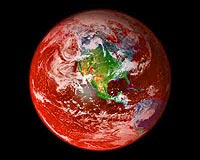| . |  |
. |
Ambo, Kiribati (UPI) Nov 11, 2010 Vulnerable nations as well as some major economies have signed a declaration that calls for more and immediate action on the causes and adverse impact of climate change. Signed at the Tarawa Climate Change Conference in Kiribati, the Ambo Declaration -- named for the village where Kiribati's Parliament sits -- will be presented at the United Nations-brokered climate change conference in Cancun, Mexico, which begins Nov. 29. Particularly encouraging, said Kiribati President Anote Tong, is that signatories to the declaration include not only small islands and states -- the vulnerable countries -- but also developed countries in the region, including Australia and New Zealand. China's signature is considered a triumph, given that Beijing's position "has been one that is very difficult to pin down in terms of the wider negotiations," Tong told Radio Australia. Other signees are: Brazil, Canada, Cuba, Fiji, Japan, Kiribati, the Maldives, the Marshall Islands, the Solomon Islands and Tonga. But Tong said he was disappointed that the United States and the United Kingdom chose not to sign the declaration, instead opting for observer status. "I guess I'm not surprised but I remain disappointed. I would have liked to have seen some firmer commitment and I think we were all disappointed that they did not come really to discuss but merely to observe," the president told Radio Australia. Observers say the significance of the Ambo Declaration is that it unites a diverse group of countries ahead of the Cancun meeting. The signees expect Wednesday's declaration to contribute "some positive steps forward" in Cancun, Tong said. Kiribati, located in the central tropical Pacific Ocean, is comprised of 32 coral atolls and one island. Their combined land mass approximately equals the size of New York City. In South Tarawa, where about half of the country's population of 100,000 live, the average elevation is 6.5 feet above sea level, with the highest point registering at a mere 10 feet. That makes the low-lying nation particularly vulnerable to climate change. Tong said climate change was the greatest moral challenge facing humanity today, pointing to villages in his nation that have been forced to move due to coastal erosion. "We face unending claims for assistance to rebuild homes and to repair damages by unusually high tides, which we, of course, do not have the resources to do," Tong said. A study by the Australian National Tidal Center showed that sea levels in Kiribati have averaged a rise of 0.15 an inch a year since 1992.
Share This Article With Planet Earth
Related Links Climate Science News - Modeling, Mitigation Adaptation
 Extreme Global Warming In The Ancient Past
Extreme Global Warming In The Ancient PastSouthampton, UK (SPX) Nov 11, 2010 Variations in atmosphere carbon dioxide around 40 million years ago were tightly coupled to changes in global temperature, according to new findings published in the journal Science. The study was led by scientists at Utrecht University, working with colleagues at the NIOZ Royal Netherlands Institute for Sea Research and the University of Southampton. "Understanding the relationship ... read more |
|
| The content herein, unless otherwise known to be public domain, are Copyright 1995-2010 - SpaceDaily. AFP and UPI Wire Stories are copyright Agence France-Presse and United Press International. ESA Portal Reports are copyright European Space Agency. All NASA sourced material is public domain. Additional copyrights may apply in whole or part to other bona fide parties. Advertising does not imply endorsement,agreement or approval of any opinions, statements or information provided by SpaceDaily on any Web page published or hosted by SpaceDaily. Privacy Statement |